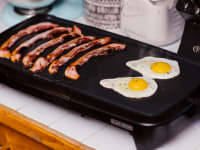Forget the pan—here's how to make crepes with a crepe maker
This kitchen tool helped us make the most delicious crepes.
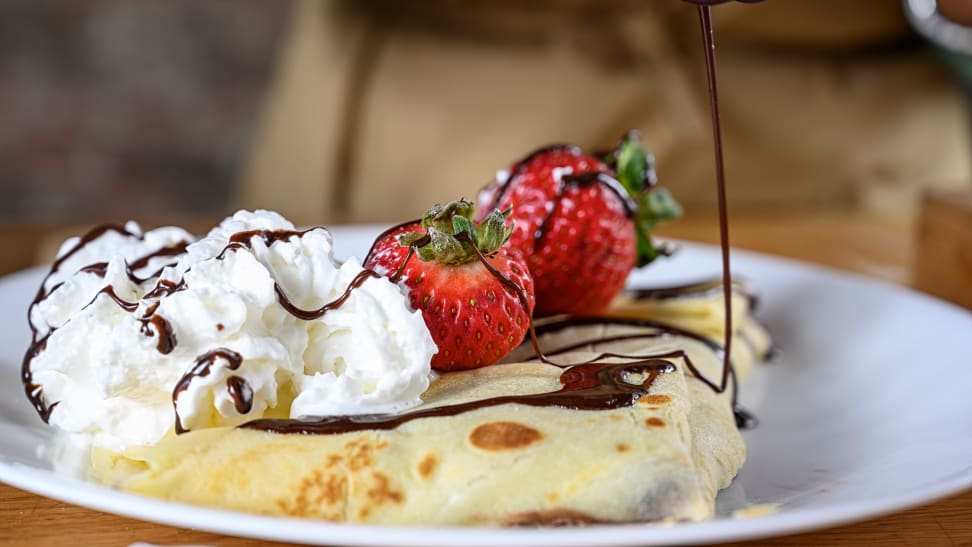 Credit:
Reviewed / Betsey Goldwasser
Credit:
Reviewed / Betsey Goldwasser
Recommendations are independently chosen by Reviewed's editors. Purchases made through the links below may earn us and our publishing partners a commission. Prices were accurate at the time this article was published but may change over time.
Grilling, fireworks, and tons of fun-filled activities with friends and family—it all sounds like a typical Fourth of July for us. Yet only ten days after the American Independence Day comes Bastille Day, when the French celebrate the revolutionary thinking that reshaped the western hemisphere with their own traditions. To commemorate the French spirit of freedom and liberty—and accommodate our sweet tooth—we thought we’d share how to make traditional French crepes with this easy-to-maneuver crepe griddle.
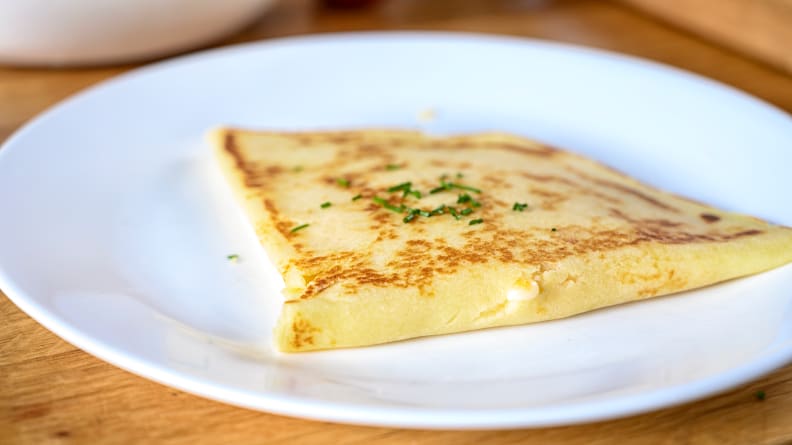
A savory crepe with ham and cheese.
Traditionally, the French eat crepes at dinnertime on the holy day of La Chandeleur on Feb. 2 to celebrate the end of winter and hope for harvest—but the dish isn't so rare anymore. Most Americans have probably have had crepes at a trendy brunch restaurant or from a street vendor in a French city. With their exploding popularity, most of my French friends even have a dedicated crepe maker at home for regular meals and entertaining. This inexpensive, easy-to-use device has come in handy for me, too—and if you love crepes, they're a worthwhile investment. Here's how to use a crepe maker to make the very best sweet and savory crepes.

A sweet crepe with strawberry, Nutella, and whipped cream.
Recipe: Classic French Crepes
What You Need:
- A crepe maker, or a non-stick pan
- A crepe spreader and spatula set for even thickness
- A large mixing bowl
- A hand mixer
- A ladle, or ½ measuring cup
- A small container for melted butter
- A pastry brush
- 2 cup all-purpose flour
- 4 large brown eggs
- 2 ¼ cups milk
- 2 tbsp melted butter
- 1 pinch of salt
- 2 tbsp sugar (optional)
- 1 tbsp rum, or any brown liquor (optional)
- 1 splash fleur d’Oranger (optional)
- Assorted fillings and toppings (Nutella, strawberries, whipped cream for sweet, cheese, ham, and eggs for savory)
Time Needed:
30 minutes
Difficulty:
Easy
Step-by-Step:
1. Turn the griddle on medium heat
If you’re cooking over stovetop, heat the pan on medium.
2. Prepare the batter

Combine all ingredients with a hand mixer.
In a mixing bowl, combine the all-purpose flour and the eggs. Then, turn the hand mixer on the lowest speed and mix until well combined. Gradually pour in the milk until the batter achieves a thick, syrupy consistency.
If you're making sweet crepes, now add the 2 tbsp sugar, 1 tbsp rum, and 1 splash fleur d'Oranger and mix.
3. Once hot, brush the griddle with melted butter
In our experience, you only need to brush the griddle once every four to five crepes.
4. Pour the batter

Make sure not to break the crepe while spreading it counterclockwise.
Take ⅓ cup batter and pour it over the griddle. Using the crepe spreader, slowly spread the batter in a consistent, counterclockwise motion. The batter might be soft and gooey, so be careful not to break the circle while spreading—but make sure the crepe is still thin and even. Ideally, the crepe should thinly cover the surface of the griddle.
If you’re cooking over a stovetop, adjust the amount of batter to make sure that it only thinly covers the surface of the pan.
5. Flip the crepe

Carefully lift up the crepe with a spatula.
Once you start seeing “bubbles” forming on the crepe, poke the edges with a crepe spatula. If the edges are ready, you’ll be able to lift up the edges with the spatula. Slowly and carefully slide the spatula under the crepe, then lift and quickly flip the crepe upside down. One side should take about three minutes on the griddle we used.
If you’re making it on stovetop, use the coloring as judgement. The crepes are ready when light brown spots start to appear.
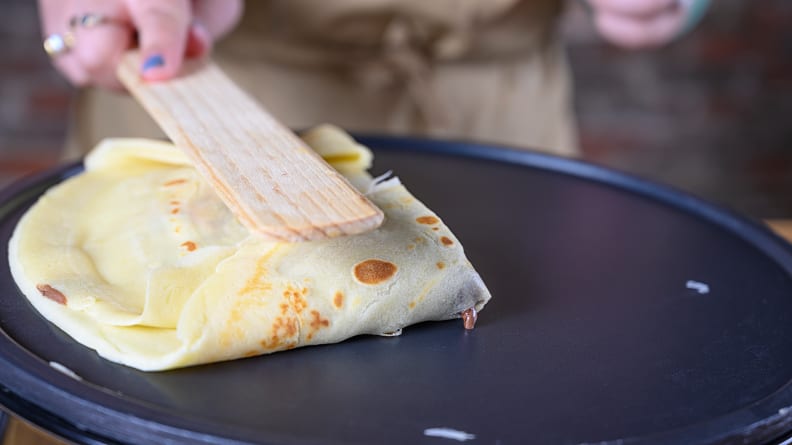
Fold the crepes once they're filled and done cooking.
6. Fill up and serve
If you're cooking for one or a small group, you can start putting your favorite toppings on the crepe while it’s still on the griddle. This method is especially important if you’re making savory crepes—it will allow any cheese to melt properly. For sweet crepes, common fillings include whipped cream, Nutella, bananas, and strawberries. You should move fast, because the hot plate can potentially overcook the crepe and toppings.
When it comes time to fold, you can simply roll the crepes, fold them in half the way you would an omelette, or try to make traditional triangle-shaped crepes. To fold the crepe on the griddle, you need to slide your spatula under one side, carefully lift it up, and fold it in half. Using the spatula, press the halved crepe down to make it as thin as possible. Then, lightly fold over both corners of the crepe towards the center to achieve a triangle shape.

Add the fillings when the crepe is done cooking.
An alternative to filling on the griddle is to put the cooked crepes on a plate and cover with a warm dish towel to be filled off the griddle. You can sprinkle a bit of water on them to keep the moisture from escaping. Enjoy!
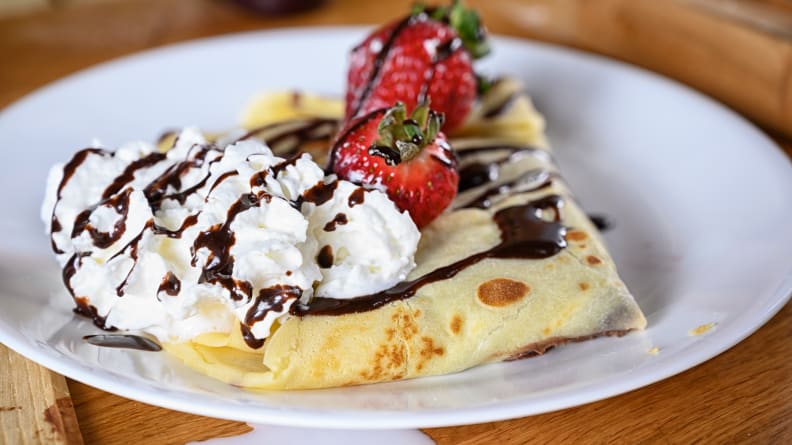
Enjoy your crepes!

